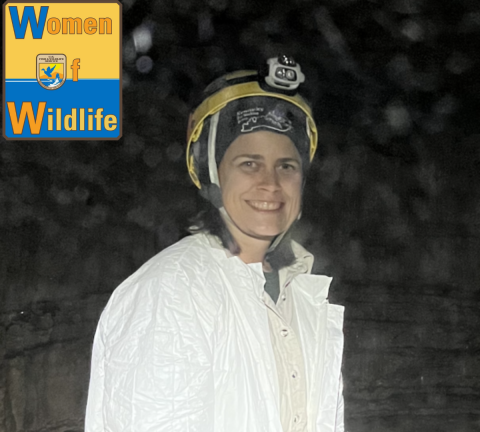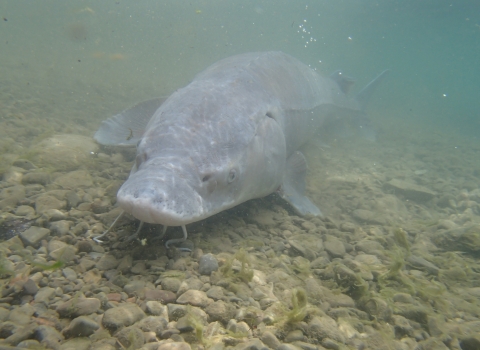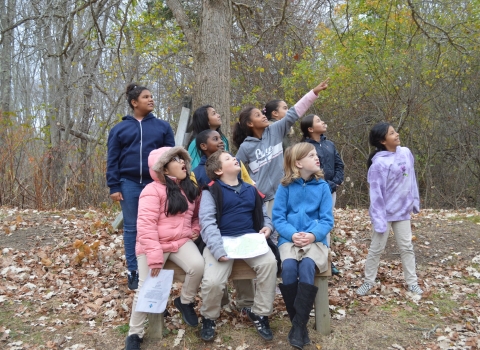The desire to help is a cornerstone of Pam McDill’s character. Helping people or the environment, it doesn’t matter. It fills her soul.
It was no surprise when, after earning her degree in Anthropology from the University of Arkansas (UA), she returned to her hometown of Little Rock to begin work as an EMT.
“I worked for many years as an EMT, but I eventually recognized that doing this work was not emotionally or physically sustainable for me,” McDill recalls. “About four years into my EMT career, I decided to make a change. I wanted to do something, to continue to be helpful, only in a different way.”
That’s when the call to pursue a career in natural resource conservation came.
Juggling the crazy schedule of an EMT and remote learning, McDill earned her Bachelor of Science in natural resources from Oregon State University in 2015.
Her hard work and academic success paved the way for her to return to UA and continue her education. She began working toward her Master of Science in statistics & analytics with a concentration in biological analytics. She also pursued a graduate certificate in geospatial technologies.
Nearing graduation, McDill was keeping an eye out for potential job opportunities. A UA career services email grabbed her attention. It advertised an internship opportunity with the U.S. Fish and Wildlife Service through the agency’s Directorate Fellowship Program (DFP).
The DFP is a direct-hire program designed to increase diversity by recruiting females, people of color and other students from underrepresented populations among Service staff. Candidates receive direct-hire authority for two years after students successfully complete a rigorous 11-week paid fellowship and their related college or graduate degree requirements.
“I applied, was accepted, and completed the program in the spring/summer of 2020,” remembers McDill. As she worked remotely that spring and summer with the Baton Rouge Fish and Wildlife Conservation Office, she began to fall in love with the Service and its mission.
“Working for the FWS has always been a bit of a dream. I honestly thought it was just that.”
Little did she know, her exposure through the DFP program would make her dream, a reality.
After graduating that fall, her hiring profile became available to all hiring managers within the Service. Jennifer Garland, who had served as her deputy field supervisor during her internship, saw her profile, and reached out about a job opportunity.
“I was ecstatic,” recalls McDill.
She interviewed, got the job, and moved to Kentucky where she now serves as a fish and wildlife biologist in the Kentucky Ecological Services Field Office.
In her role, Pam spends most of her time looking at the intersection of federally listed threatened and endangered species (and their habitats) and proposed project activities.
Consulting with partners and other agencies on projects like residential developments, solar arrays, or infrastructure improvements, Pam ensures these proposed actions don’t jeopardize federally listed species and adversely modify their habitats.
McDill examines projects, maps, data, and reports to offer comments and suggestions to project proponents in hopes of finding solutions to conservation issues. Her feedback helps to ensure proposed projects are the most successful and conservation friendly versions of themselves.
“This is a big responsibility that I take very seriously,” says McDill. “I think it's important to be responsive and available so that we can maintain relationships with people that are regulated to consult with us under the Endangered Species Act. The more willing we are to work with partners and project proponents, the more they will be willing to work with us. This is how conservation works, it starts with a conversation.”
McDill views her job as an integral part of the Service’s mission - to work with others to conserve, protect, and enhance fish, wildlife, and plants and their habitats for the continuing benefit of the American people.
“To me, the first phrase of the mission, ‘working with others,’ is the most important. Without it, the rest of the mission is just not possible, so that is what I try to do.”
McDill notes that through her reviews and consultations, plants and animals are not prioritized over people. Rather, conservation involves collaboration.
"We understand that conservation is multi-faceted, and it cannot happen without people,” she says. “There are solutions to conservation issues, but we have to be willing to work together to achieve them.”
McDill finds immense satisfaction in the job she does day to day, but she also cherishes the work environment of the Service.
“If you are looking for a safe, supportive space to be, I think you will find that you are welcome here,” says McDill. “I feel safe with the Service. I feel included. I have been asked to be a part of the conversation. Because of this, I feel valued as an employee, and this encourages me to do my best for the agency that proactively supports me.”
Approaching the second anniversary of her start with the Service, McDill is thankful that she stumbled across her DFP internship.
“I would just like to thank the Kentucky Field Office, my co-workers, and my friends in the Southeast Region for being so welcoming and supportive. I think it means more than you know,” says McDill. “It took me ten years to get here, but I think I've finally found where I'm supposed to be.”
Editor’s note: During Women’s History Month, the U.S. Fish and Wildlife Service celebrates the accomplishments and commitment of women throughout the organization. The Women of Wildlife, or WOW, story series highlights some of the women serving in the Southeast Region.





